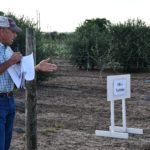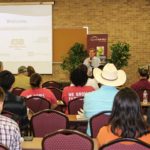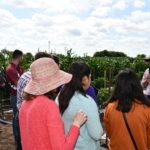Writer: Paul Schattenberg, 210-859-5752, paschattenberg@ag.tamu.edu
Contact: Dr. Daniel Leskovar, 830-278-9151, Daniel.Leskovar@ag.tamu.edu
UVALDE – More than 80 agricultural producers and those in agriculture-related businesses attended the recent Vegetable Spring Field Day at the Texas A&M AgriLife Research and Extension Center in Uvalde.
Participants came to the center to get science-based information and insights into the production of various crops, as well as different growing systems and improvement methods, said Dr. Daniel Leskovar, center director and Texas A&M AgriLife Research vegetable physiologist.
Attendees were transported to several different locations on the center grounds to get an up-close look at research being conducted on various field plots and inside greenhouse and hoop-house facilities.
The field day also included agricultural vendor and supplier displays and tours of center laboratories and other facilities.
“During the field day, participants were able to see work related to cover crops; hydroponic, high-tunnel and in-field production; vegetable breeding, nitrogen-use efficiency and tomato grafting,” Leskovar said.
Field days are a great opportunity for area producers to get a firsthand look at research and technology for vegetable crop improvement, said Samantha Korzekwa, Texas A&M AgriLife Extension Service agriculture and natural resources agent, Uvalde County.
 “Producers also get useful, practical information on how to care for their crops and can see the results of testing different crop varieties to find out which may perform the best in this area,” she said.
Topics during the field day related to the nutraceutical potential of spinach and watermelon; Texas A&M short-day onion evaluations for Southern Texas; tomato, onion and melon production; chemical control for insect vectors and plant diseases; the Texas A&M AgriLife spinach breeding program; and tomato disease management.
Additional stops at center facilities and in the field related to hydroponic production of leafy greens; humic acids to promote growth in watermelons; wild melon varieties; high-tunnel and open-field tomato production; olive varieties for Texas; mustard cover crops/sensing roots and leaves; and watermelon screening for drought stress.
“Producers also get useful, practical information on how to care for their crops and can see the results of testing different crop varieties to find out which may perform the best in this area,” she said.
Topics during the field day related to the nutraceutical potential of spinach and watermelon; Texas A&M short-day onion evaluations for Southern Texas; tomato, onion and melon production; chemical control for insect vectors and plant diseases; the Texas A&M AgriLife spinach breeding program; and tomato disease management.
Additional stops at center facilities and in the field related to hydroponic production of leafy greens; humic acids to promote growth in watermelons; wild melon varieties; high-tunnel and open-field tomato production; olive varieties for Texas; mustard cover crops/sensing roots and leaves; and watermelon screening for drought stress.
 Dr. Parr Rosson, AgriLife Extension interim director, College Station, was also among the field day attendees.
“It really does start from the ground up,” Rosson said. “By helping producers grow better crops, we are strengthening communities. And when we provide knowledge, technology and improved agricultural practices for making producers more profitable, this also helps toward improving human and animal health and making a positive difference in people’s lives.”
Tim Miller, owner of Millberg Farm in Kyle and certified in organic production since 1989, was among the attendees. This was his first time to attend a field day at the center.
“I wanted to see what the center was doing in the way of organic production and was also interested in finding out more about the center’s research on spinach production since I just found out Dr. Joshi just got a USDA grant to study that,” Miller said.
In collaboration with the Texas Department of Agriculture and University of California at Davis, Dr. Vijay Joshi, an AgriLife Research crop physiologist at the center, will lead a project to help agricultural producers and consumers through improving nitrogen use efficiency and food safety in spinach.
Ed Ritchie, an agricultural producer from Tiro Tres Farms in La Pryor, was another of the field day participants. He has attended several of the center’s field days.
“We produce a lot of spinach, but also produce some wheat, corn and grain sorghum,” Ritchie said. “The presentations and research have been interesting and also gave me a chance to get some TDA continuing education credits. It was interesting to find out about the use of cover crops in the production system.”
Another area of particular interest to attendees was tomato production and grafting.
“We are producing regular and grafted tomato varieties in greenhouse, high-tunnel and field environments,” Leskovar said. “There’s great interest in grafting attractive tomato varieties onto more resistant rootstocks to help manage soil-borne pathogens while enhancing both growth and yield. This process can be a great benefit to area producers in helping them breed and combine the types of tomato plants that perform well in this area and have characteristics that will appeal to consumers.”
Dr. Craig Nessler, AgriLife Research director, College Station, also attended and spoke at the field day.
“Our focus is always on the agricultural producer,” Nessler said. “These field days are important because they show producers what research we are doing to help them improve their crops and be more productive, as well as how we share that information through our AgriLife Extension outreach.
“Our goal is to help their operations to be economically viable by giving them science-based and real-world tested ways to do things better and with fewer or less expensive inputs.”
-30-
Dr. Parr Rosson, AgriLife Extension interim director, College Station, was also among the field day attendees.
“It really does start from the ground up,” Rosson said. “By helping producers grow better crops, we are strengthening communities. And when we provide knowledge, technology and improved agricultural practices for making producers more profitable, this also helps toward improving human and animal health and making a positive difference in people’s lives.”
Tim Miller, owner of Millberg Farm in Kyle and certified in organic production since 1989, was among the attendees. This was his first time to attend a field day at the center.
“I wanted to see what the center was doing in the way of organic production and was also interested in finding out more about the center’s research on spinach production since I just found out Dr. Joshi just got a USDA grant to study that,” Miller said.
In collaboration with the Texas Department of Agriculture and University of California at Davis, Dr. Vijay Joshi, an AgriLife Research crop physiologist at the center, will lead a project to help agricultural producers and consumers through improving nitrogen use efficiency and food safety in spinach.
Ed Ritchie, an agricultural producer from Tiro Tres Farms in La Pryor, was another of the field day participants. He has attended several of the center’s field days.
“We produce a lot of spinach, but also produce some wheat, corn and grain sorghum,” Ritchie said. “The presentations and research have been interesting and also gave me a chance to get some TDA continuing education credits. It was interesting to find out about the use of cover crops in the production system.”
Another area of particular interest to attendees was tomato production and grafting.
“We are producing regular and grafted tomato varieties in greenhouse, high-tunnel and field environments,” Leskovar said. “There’s great interest in grafting attractive tomato varieties onto more resistant rootstocks to help manage soil-borne pathogens while enhancing both growth and yield. This process can be a great benefit to area producers in helping them breed and combine the types of tomato plants that perform well in this area and have characteristics that will appeal to consumers.”
Dr. Craig Nessler, AgriLife Research director, College Station, also attended and spoke at the field day.
“Our focus is always on the agricultural producer,” Nessler said. “These field days are important because they show producers what research we are doing to help them improve their crops and be more productive, as well as how we share that information through our AgriLife Extension outreach.
“Our goal is to help their operations to be economically viable by giving them science-based and real-world tested ways to do things better and with fewer or less expensive inputs.”
-30-

Dr. Larry Stein, Texas A&M AgriLife Extension horticulturist based in the Uvalde center, shows field research being done on olives. (Texas A&M AgriLife photo)

Texas A&M AgriLife Extension Service interim director Dr. Parr Rosson addressing field day attendees. (Texas A&M AgriLife photo by Liza Silva Sanchez)

